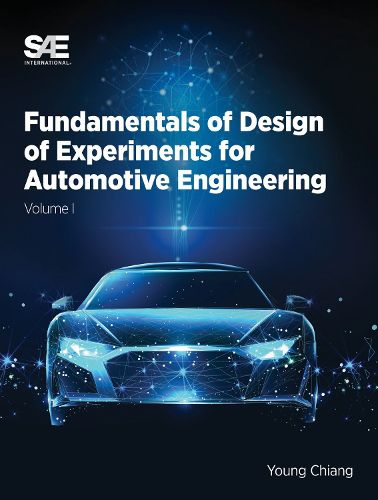Readings Newsletter
Become a Readings Member to make your shopping experience even easier.
Sign in or sign up for free!
You’re not far away from qualifying for FREE standard shipping within Australia
You’ve qualified for FREE standard shipping within Australia
The cart is loading…






This title is printed to order. This book may have been self-published. If so, we cannot guarantee the quality of the content. In the main most books will have gone through the editing process however some may not. We therefore suggest that you be aware of this before ordering this book. If in doubt check either the author or publisher’s details as we are unable to accept any returns unless they are faulty. Please contact us if you have any questions.
In a world where innovation and sustainability are paramount, Fundamentals of Design of Experiments for Automotive Engineering: Volume I serves as a definitive guide to harnessing the power of statistical thinking in product development. As first of four volumes in SAE International's DOE for Product Reliability Growth series, this book presents a practical, application-focused approach by emphasizing DOE as a dynamic tool for automotive engineers. It showcases real-world examples, demonstrating how process improvements and system optimizations can significantly enhance product reliability.
The author, Yung Chiang, leverages extensive product development expertise to present a comprehensive process that ensures product performance and reliability throughout its entire lifecycle. Whether individuals are involved in research, design, testing, manufacturing, or marketing, this essential reference equips them with the skills needed to excel in their respective roles.
This book explores the potential of Reliability and Sustainability with DOE, featuring the following topics:
Fundamental prerequisites for deploying DOE: Product reliability processes, measurement uncertainty, failure analysis, and design for reliability.
Full factorial design 2K: A system identification tool for relating objectives to factors and understanding main and interactive effects.
Fractional factorial design 2RK-P: Ideal for identifying main effects and 2-factor interactions.
General fractional factorial design LK-P: Systematically identification of significant inputs and analysis of nonlinear behaviors.
Composite designs as response surface methods: Resolving interactions and optimizing decisions with limited factors.
Adapting to practical challenges with "short" DOE: Leveraging optimization schemes like D-optimality, and A-optimality for optimal results.
Readers are encouraged not to allow product failures to hinder progress but to embrace the "statistical thinking" embedded in DOE. This book can illuminate the path to designing products that stand the test of time, resulting in satisfied customers and thriving businesses.
$9.00 standard shipping within Australia
FREE standard shipping within Australia for orders over $100.00
Express & International shipping calculated at checkout
This title is printed to order. This book may have been self-published. If so, we cannot guarantee the quality of the content. In the main most books will have gone through the editing process however some may not. We therefore suggest that you be aware of this before ordering this book. If in doubt check either the author or publisher’s details as we are unable to accept any returns unless they are faulty. Please contact us if you have any questions.
In a world where innovation and sustainability are paramount, Fundamentals of Design of Experiments for Automotive Engineering: Volume I serves as a definitive guide to harnessing the power of statistical thinking in product development. As first of four volumes in SAE International's DOE for Product Reliability Growth series, this book presents a practical, application-focused approach by emphasizing DOE as a dynamic tool for automotive engineers. It showcases real-world examples, demonstrating how process improvements and system optimizations can significantly enhance product reliability.
The author, Yung Chiang, leverages extensive product development expertise to present a comprehensive process that ensures product performance and reliability throughout its entire lifecycle. Whether individuals are involved in research, design, testing, manufacturing, or marketing, this essential reference equips them with the skills needed to excel in their respective roles.
This book explores the potential of Reliability and Sustainability with DOE, featuring the following topics:
Fundamental prerequisites for deploying DOE: Product reliability processes, measurement uncertainty, failure analysis, and design for reliability.
Full factorial design 2K: A system identification tool for relating objectives to factors and understanding main and interactive effects.
Fractional factorial design 2RK-P: Ideal for identifying main effects and 2-factor interactions.
General fractional factorial design LK-P: Systematically identification of significant inputs and analysis of nonlinear behaviors.
Composite designs as response surface methods: Resolving interactions and optimizing decisions with limited factors.
Adapting to practical challenges with "short" DOE: Leveraging optimization schemes like D-optimality, and A-optimality for optimal results.
Readers are encouraged not to allow product failures to hinder progress but to embrace the "statistical thinking" embedded in DOE. This book can illuminate the path to designing products that stand the test of time, resulting in satisfied customers and thriving businesses.